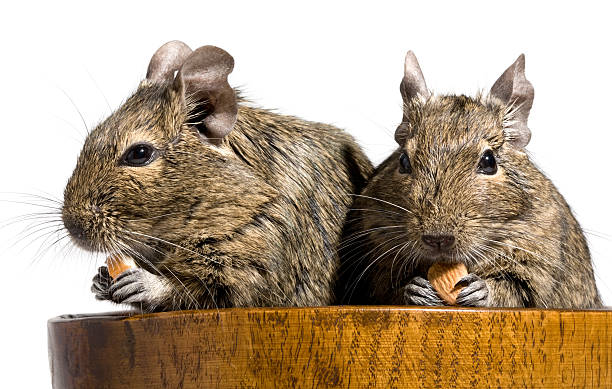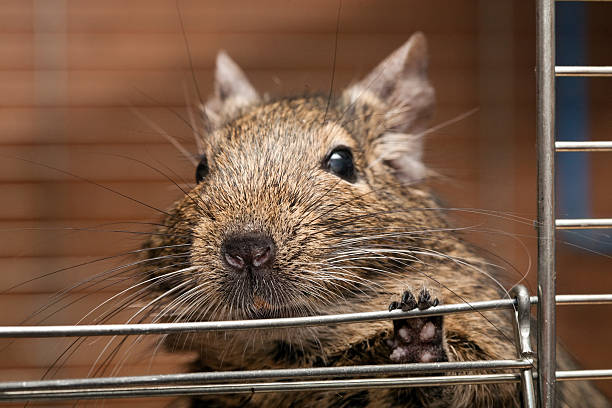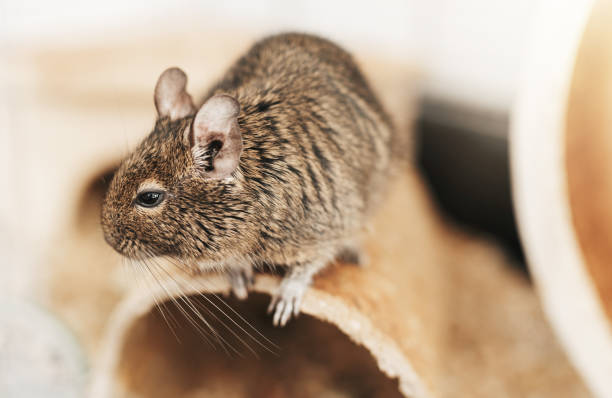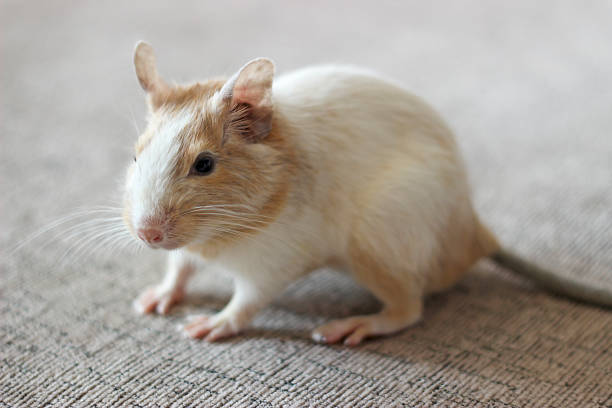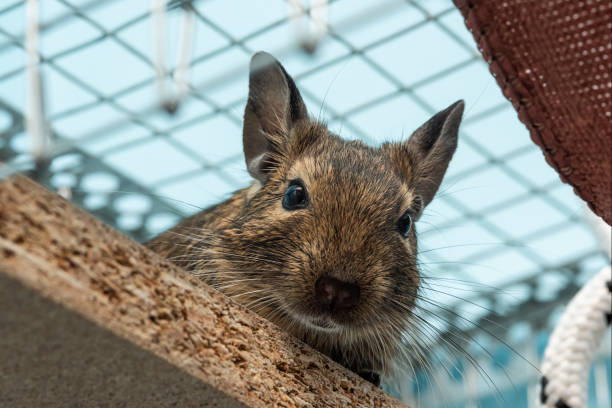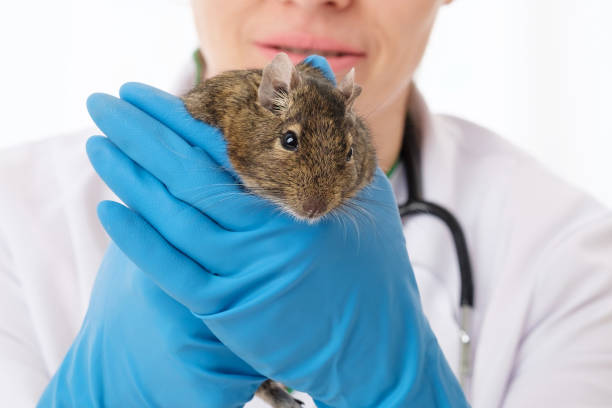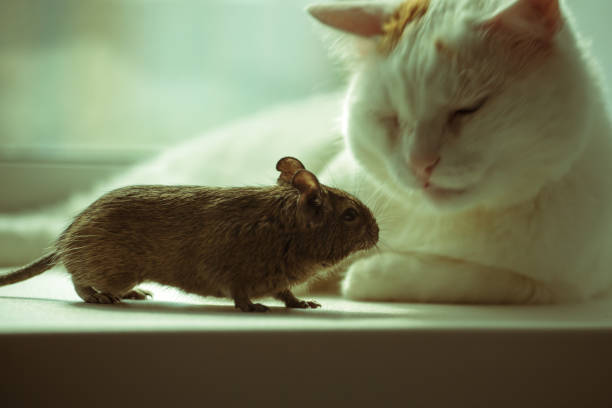Enhancing Degu Playtime: 7 Social Interaction and Enrichment Ideas for Happy Pets
This post contains affiliate links. This means I will make a commission at no extra cost to you should you click through and make a purchase. Read the full disclosure here.
Welcome to the exciting world of degu playtime and social interaction! If you’re a degu owner or considering becoming one, you’re in for a treat. These charming rodents are not only known for their adorable appearance but also for their lively and social nature. In this guide, we’ll explore the wonderful realm of degu play, companionship, and enrichment.
The Social Nature of Degus
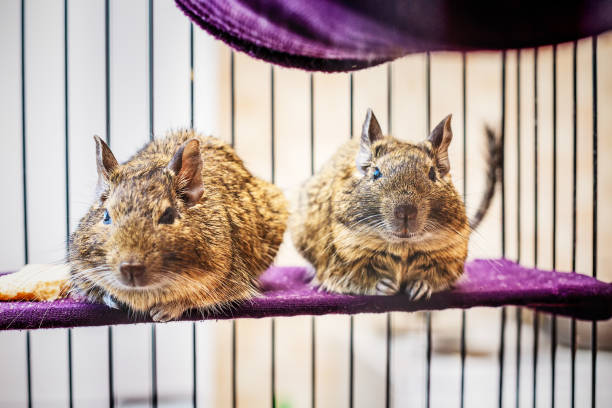
One of the standout characteristics of degus is their innate sociability. In their natural habitat of South America, they form tight-knit communities and rely on social interactions for protection and companionship. As a degu owner, it’s essential to understand and cater to this aspect of their behavior. Here’s why:
1. Companionship Matters: Just like humans, degus benefit from having friends. In fact, degus can become lonely and stressed when kept in isolation. Providing them with companions ensures they have a social outlet and emotional support.
2. Mental Stimulation: Social interaction is mentally stimulating for degus. It keeps their minds active and engaged, preventing boredom and related behavioral problems.
3. Emotional Well-being: Degus form strong bonds with their cage mates. These relationships provide comfort and security, reducing stress and promoting a positive emotional state.
4. Exercise and Play: Social interaction often involves play, which is an excellent exercise for degus. It helps them maintain a healthy weight and condition.
In the wild, degus communicate through a complex system of vocalizations, grooming, and body language. While they may not be able to chat with you in the same way, they’ll communicate their happiness through their behavior.
Playmates for Your Degu
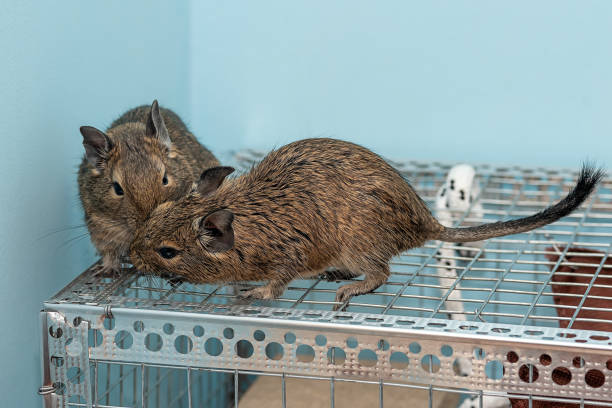
Now that we understand the significance of social interaction for degus, the next step is to consider their companions. While degus can bond with humans, they also have a strong need for the company of their own kind. Here’s why finding the right playmates for your degus is essential:
1. Degus Prefer Degus: Degus have a unique way of communicating and playing with each other. They understand each other’s body language, vocalizations, and play cues. Having another degu as a companion allows them to engage in these natural behaviors.
2. Emotional Support: Degus form deep emotional bonds with their cage mates. These bonds provide emotional security and comfort. When they have a friend, they are less likely to become stressed or anxious.
3. Exercise and Social Play: Degus are active animals that love to run, jump, and play. When they have a playmate, they can engage in social play, which is not only fun but also excellent exercise.
Finding the Right Companion

If you already have a single degu and are considering getting a companion, there are a few key points to keep in mind:
1. Same-Sex Pairs: It’s best to keep same-sex pairs or groups to prevent unplanned litters. Degus are prolific breeders, so mixed-sex groups can quickly lead to more degus than you bargained for.
2. Similar Age: Ideally, introduce degus of a similar age. This reduces the likelihood of dominance issues, as younger degus may challenge older ones for leadership roles.
3. Quarantine New Degus: When introducing new degus, it’s crucial to quarantine them in a separate cage for a few weeks. This quarantine period helps you ensure that the newcomers are healthy and not carrying any diseases that could harm your existing degus.
4. Gradual Introduction: After the quarantine period, introduce the degus gradually. Place their cages side by side so they can get used to each other’s scent and presence before any direct contact.
5. Supervised Meetings: When you feel it’s time for them to meet face-to-face, do so in neutral territory, away from their cages. Supervise their interactions closely to ensure they get along.
6. Be Patient: Remember that not all degus will become instant friends. Some may take longer to warm up to each other. Be patient and give them time to establish their social hierarchy.
Group Dynamics
In the wild, degus live in colonies, and this social structure is reflected in their behavior. When you have multiple degus living together, they will establish a hierarchy, with one or more dominant individuals. This is entirely natural and not a cause for concern as long as there is no excessive aggression or bullying. If conflicts do arise, they can often be resolved through careful management and monitoring.
Enrichment Activities
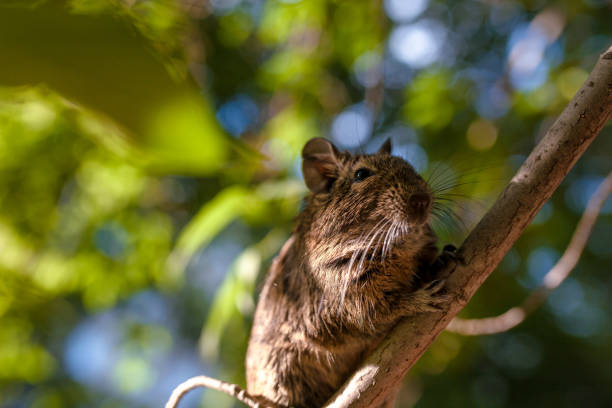
Now that you’ve taken the important step of ensuring your degus have companions, it’s time to focus on enriching their lives with stimulating activities. Enrichment is vital for keeping your degus happy, active, and mentally sharp. Here are some exciting enrichment ideas to consider:
1. DIY Toys and Puzzles
Creating your own toys and puzzles for your degus can be a fun and cost-effective way to provide enrichment. Here are a few DIY ideas:
- Toilet Paper Roll Puzzle: Stuff a cardboard toilet paper roll with hay, vegetables, or treats, and then fold the ends shut. Your degus will enjoy chewing through the roll to access the goodies inside.
- Cardboard Hideaways: Collect cardboard boxes or small containers and cut holes for your degus to explore and hide in. You can connect these boxes to create a mini maze.
- Rope Bridges: Hang sisal or natural rope bridges in their cage for climbing and exploring. Be sure the ropes are secure and safe for your degus to navigate.
2. Playtime Outside the Cage

Supervised playtime outside the cage is a fantastic way to provide mental and physical stimulation for your degus. Consider these tips:
- Degu-Proof the Area: Before letting your degus roam, make sure the play area is safe. Remove any hazards, like electrical cords, toxic plants, or small objects they could swallow.
- Use a Playpen: A small playpen or enclosed area is a great way to give your degus space to explore without the risk of them escaping.
- Rotate Toys and Hiding Spots: Place familiar toys and hiding spots in the play area to make it feel like an extension of their cage.
3. Providing Hiding Spots and Tunnels
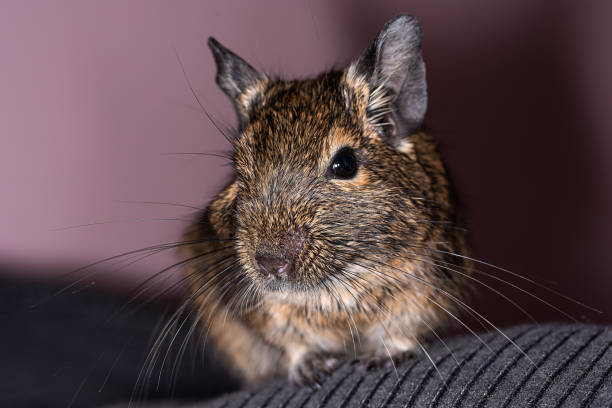
Degus love to hide and explore tunnels. Consider adding tunnels and hiding spots to their cage:
- Wooden Hideouts: Wooden hideouts provide a safe and cozy place for your degus to retreat to when they need some alone time.
- Tunnels: Invest in tunnels or create your own from PVC pipes. These mimic the burrows Degus would use in the wild.
4. Rotating Toys


Degus can become bored with the same toys over time. Keep their environment fresh and exciting by rotating toys in and out of their cage. This change in scenery will pique their curiosity and prevent them from getting too comfortable with their surroundings.
5. Food-Based Enrichment
Introduce food-based enrichment to stimulate their foraging instincts:
- Scatter Feeding: Instead of placing food in a dish, scatter it around the cage. Your degus will enjoy searching for their meals.
- Foraging Toys: Invest in foraging toys designed for small animals. These toys require your degus to work for their treats, providing mental stimulation.
- Herbs and Edible Plants: Offer a variety of safe, edible plants and herbs for your degus to nibble on. This not only provides enrichment but also adds variety to their diet.
By incorporating these enrichment activities into your degus’ daily routine, you’ll help keep their minds sharp and their bodies active. Plus, you’ll have the pleasure of watching them explore and play, which is incredibly rewarding for both you and your degus.
Mental Stimulation: Keeping Degus Sharp

Mental stimulation is a key component of degu care that often gets overlooked. However, it’s just as crucial as physical activity for their overall well-being. Here’s why mental stimulation matters and how you can provide it for your degus:
Why Mental Stimulation is Important
1. Prevents Boredom: Boredom can lead to a range of issues in degus, including overeating, aggression, and destructive behavior. Mental stimulation keeps them engaged and content.
2. Mimics Natural Foraging: In the wild, degus spend a significant portion of their time foraging for food. Providing mental stimulation through food-based activities mimics this natural behavior.
3. Cognitive Health: Mental exercise is essential for maintaining cognitive health in degus, just as it is for humans. It helps keep their brains sharp and alert.
Providing Mental Stimulation

Here are some effective ways to provide mental stimulation for your degus:
1. Food Puzzles: Invest in food puzzles or create your own. These puzzles require your degus to work for their treats, stimulating their problem-solving skills.
2. Hide and Seek: Hide small treats or pieces of vegetables around their cage or play area. Your degus will enjoy searching for these hidden treasures.
3. Novel Objects: Introduce new objects or toys into their environment from time to time. This could be a new type of tunnel, a puzzle toy, or even a simple mirror. Novelty keeps their minds active.
4. Rotating Toys: As mentioned earlier, rotating toys in and out of their cage prevents them from getting bored with their surroundings.
5. Training and Tricks: Degus are intelligent creatures and can learn simple tricks. Teach them tricks like coming when called or jumping onto a designated platform. Use positive reinforcement and patience during training.
6. Social Interaction: Interaction with other degus also provides mental stimulation. The social dynamics within their group, including play and hierarchy establishment, engage their minds.
Remember that mental stimulation should be a part of their daily routine, just like physical exercise and playtime. The combination of physical and mental activities ensures that your degus are both physically fit and mentally sharp.
Signs of Mental Stimulation
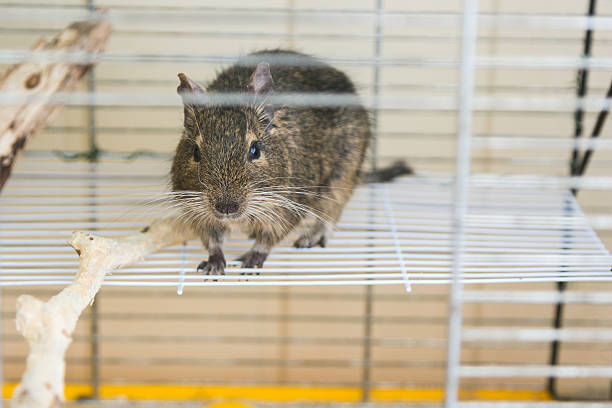
How can you tell if your efforts are paying off? Here are some signs that your degus are mentally stimulated and content:
- Active Play: Engaged degus will be active in their play, whether it’s chasing each other, exploring their environment, or working on a food puzzle.
- Curiosity: They’ll show curiosity about new objects or changes in their environment, investigating these with interest.
- Content Behavior: Mentally stimulated degus are less likely to exhibit negative behaviors like excessive chewing, aggression, or overeating due to boredom.
- Healthy Appetite: Mental stimulation can also increase their appetite for food-based puzzles and foraging activities.
By providing a combination of social interaction, physical activity, and mental stimulation, you’re ensuring that your degus live a rich and fulfilling life.
Playtime Safety: Ensuring a Secure Environment
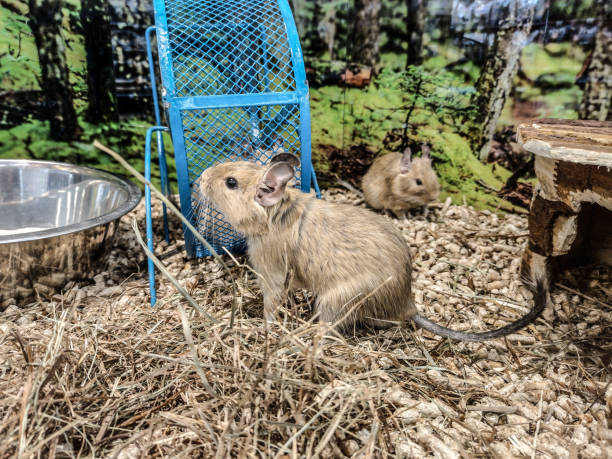
While playtime outside the cage can be incredibly beneficial for your degus, it’s essential to prioritize their safety. Degus are curious and agile creatures, so creating a secure play environment is paramount. Here are some steps to ensure their safety during playtime:
1. Degu-Proof the Play Area
Before letting your degus out of their cage, take the time to thoroughly degu-proof the play area. This means removing or securing any potential hazards. Here’s what to consider:
- Electrical Cords: Degus may chew on electrical cords, which can lead to serious injuries. Use cord protectors or cover cords with plastic tubing to deter chewing.
- Toxic Plants: Ensure there are no toxic plants within reach of your degus. Some common houseplants can be harmful if ingested.
- Small Objects: Remove any small objects that your degus could swallow. Degus are curious and may nibble on items they find.
- Hide Wires: Hide or secure any wires that are part of your furniture or home decor. Degus love to explore and may get stuck in tight spaces.
2. Use a Playpen or Enclosed Area

It’s wise to use a playpen or create an enclosed play area for your degus. This provides them with a safe space to explore without the risk of them escaping into other parts of your home. Ensure the playpen has secure sides that they cannot climb or jump over.
3. Supervise Playtime
Never leave your degus unsupervised during playtime. While degus are generally well-behaved, accidents can happen. Being present allows you to intervene quickly if needed and ensures their safety.
4. Provide Hiding Spots
Even in a safe play area, degus may sometimes feel overwhelmed. Provide hiding spots, like small cardboard boxes or tunnels, where they can retreat if they need a break or feel anxious.
5. Rotate Playtime Companions
If you have multiple degus, consider rotating which ones you allow to play together. Some degus may not get along during playtime, so giving each degus an opportunity to interact with others can reduce tension.
6. Regularly Check Play Equipment
Inspect any play equipment you use, such as ropes, bridges, or tunnels, for signs of wear and tear. Replace or repair any damaged items to prevent accidents.
7. Set a Time Limit
Degus can become tired, so it’s a good idea to set a time limit for play sessions. Typically, 30 minutes to an hour is sufficient, but observe your degus’ behavior to determine their comfort level.
By taking these precautions and maintaining a safe playtime environment, you can ensure that your degus enjoy their play sessions without risk to their well-being. Remember, safety should always come first to provide a positive and worry-free experience for both you and your beloved degus.
Signs of Happy and Content Degus
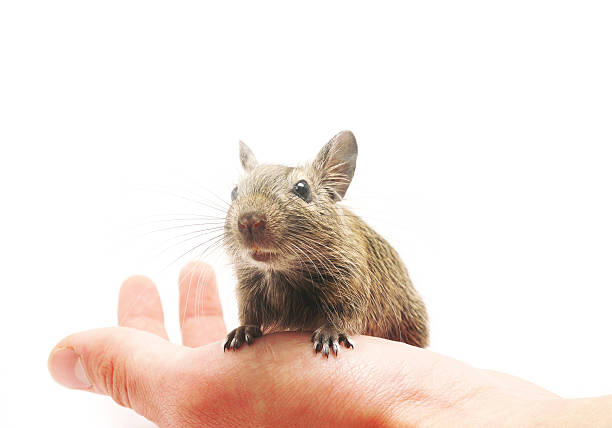
As a devoted degu owner, you want to ensure that your little companions are not only safe during playtime but also genuinely enjoying themselves. Fortunately, degus are expressive animals, and they often exhibit clear signs of happiness and contentment when they’re having a good time. Here are some indicators to look for:
1. Active Play
Happy degus are active degus! When they’re having fun, they’ll engage in various playful behaviors, such as:
- Chasing Each Other: Playful chasing is a common behavior among degus, especially when they’re interacting with their cage mates.
- Leaping and Hopping: You may see them leaping or hopping around, displaying their agility and energy.
- Zoomies: Degus sometimes have bursts of energy where they sprint around their play area, also known as the “zoomies.”
- Playful Nipping: Gentle nipping during play is normal and is a way for degus to interact with each other.
2. Social Interaction

Degus are social creatures, so happy playtime often involves positive social interactions. Look for signs like:
- Grooming: Degus may groom each other as a sign of affection and bonding.
- Close Proximity: Happy degus will often stay close to each other, snuggling or resting side by side.
- Vocalizations: Content degus may make soft chirping sounds during play, indicating their comfort and happiness.
3. Explorative Behavior
During playtime, degus love to explore their environment. Signs of exploration include:
- Investigating Objects: They’ll investigate new toys, tunnels, and hiding spots with curiosity.
- Foraging: If you’ve hidden treats for them to find, they’ll eagerly search for and consume them.
- Scent Marking: Degus may mark their play area with scent markings by rubbing their scent glands on objects, indicating a sense of ownership and comfort.
4. Relaxed Posture
When degus are at ease, their body language reflects it:
- Relaxed Tails: Their tails will be held in a relaxed, neutral position, not puffed up or held stiffly.
- Ears Forward: Their ears are alert but not pinned back, signaling that they are comfortable and engaged.
- No Signs of Stress: There should be no signs of stress, such as rapid breathing, teeth chattering, or raised fur.
5. Healthy Appetite
Happy degus will have a healthy appetite for both food and treats during playtime. If they eagerly accept treats and nibble on hay or vegetables, it’s a good sign that they’re enjoying themselves.
6. Contented Rest
After an active play session, you may observe your degus resting comfortably together. This is a clear indication that they’ve had a fulfilling and enjoyable time.
By observing these signs during playtime, you can gain valuable insights into your degus’ emotional well-being and the success of their social interactions and enrichment activities.
Final Thoughts
As a devoted degu owner, you’ve unlocked the secrets to a joyful and enriched life for your adorable companions. Your commitment to their care and well-being will undoubtedly lead to a strong bond and years of delightful moments together.
We hope this guide has been a valuable resource on your journey to becoming a responsible and loving degu owner. Keep exploring new ways to engage and entertain your degus and cherish the rewarding experience of witnessing their happiness and playfulness.

